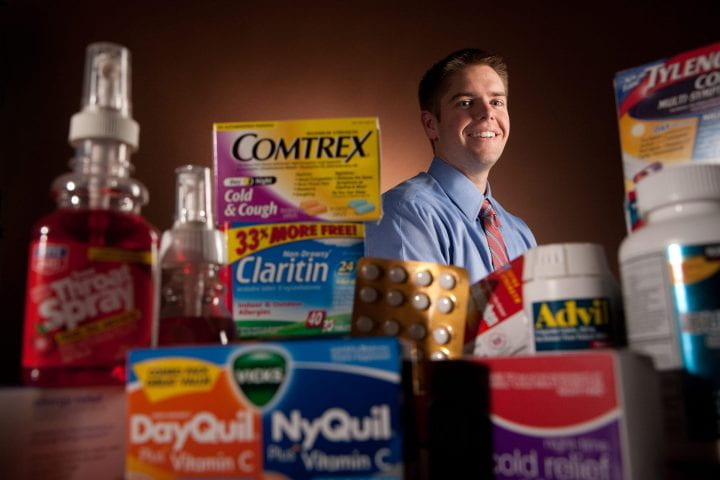The marketing of meds
Doctoral candidate in marketing at The Paul Merage School of Business studies how consumers select over-the-counter drugs.

DayQuil, NyQuil, Advil, Tylenol, Theraflu? Comtrex, Claritin or generic? How does an achy, feverish, congested shopper choose?
Unfortunately, not in a way that demonstrates knowledge of the drugs’ active ingredients, says Jesse Catlin, a doctoral candidate in marketing at UC Irvine’s Paul Merage School of Business. Increasing reports of acetaminophen overdose – a leading cause of acute liver failure in the U.S. – are one result.
Catlin is studying how consumers make decisions about buying and taking over-the-counter medications in an effort to foster more informed choices. His research – conducted through surveys and mock buying exercises in the lab and online – recently earned him a $10,000 Public Impact Fellowship.
Instituted in 2009 by Graduate Division Dean Frances Leslie, the prize supports UCI grad students whose work has the potential to significantly benefit society. Four $10,000 fellowships and 10 honorable-mention awards of $1,000 each are bestowed annually.
“I’ve always been interested in the role that marketing factors like branding, advertising and labeling play in consumers’ health decision making,” says Catlin, who came to UCI with a master’s in economics from California State University, Sacramento.
“Over-the-counter drugs emerged as a particularly intriguing area for research, as these are products people use all the time but about which they seem to know very little. There’s growing concern at the Food & Drug Administration about inadvertent overdoses, and I wanted to learn more about what’s going on in consumers’ minds when making OTC drug decisions.”
His early research results suggest that branding and advertising are far more influential than knowledgeable consideration of active ingredients. Individuals can overdose by taking more than one medication with the same active ingredient at the same time. Many medicines on store shelves contain different combinations of identical ingredients – including acetaminophen.
In addition to causing liver damage, acetaminophen overdoses account for at least 100,000 calls to poison centers and 56,000 emergency room visits annually. And while some of these cases are intentional, more than half are accidental, medical statistics show.
“By better understanding the decision-making process, we can better help people recognize the importance of paying attention to active ingredients in the medications they take,” Catlin says. “Consumers need to know that while OTC products are safe to use as directed, they can have serious adverse effects when misused.”